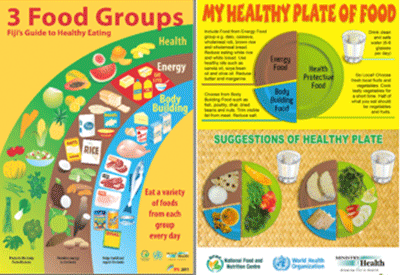What it Malnutrition?
Our bodies require a certain about of vitamins and nutrients each day to not only survive, but thrive in life. Malnutrition is a condition caused when children (and adults) don’t eat enough food, don’t eat the right sort of food, or are unable to digest food.
How is it relevant in Fiji?
For Fijian children there are two types of malnutrition: over-nutrition and under-nutrition.
Over nutrition can lead to childhood obesity, while under-nutrition can lead to a condition known as Protein Energy Malnutrition, which we’ll look into further in this section. Both types of malnutrition
can be accompanied by vitamin deficiencies (especially iron and vitamin A deficiency).
In Fiji malnutrition is much more prevalent than it should be in a land filled with nutritious fruits, vegetables and root crops and an ocean full of fish. Under-nutrition is the leading
cause of childhood mortality; in 2013 alone it claimed the lives of 420 children under the age
of five.
Who is vulnerable?
Those most at risk of malnutrition are children beginning complementary feeding at around 5-7 months of age. While for the first 6 months breastfeeding provides all the nutrients they need; after 6 months babies require healthy complementary foods to help them grow.
If we give our children unhealthy junk foods, or not enough healthy foods
they can quickly fall into malnutrition, as they are completely reliant on their
caregivers for food.
What are the risks to Fijians?
Protein Energy Malnutrition can cause ;
- Children to be underweight (based on their height and age)
- Stunting (where they stop growing taller)
- Wasting (where they start losing muscle mass) – if left untreated
Malnutrition is Fiji’s number 1 childhood killer.
In the first two years of life babies are going through major developments and growth, particularly mental, co-ordination and strength. Malnutrition it
detrimental to the physical growth, strength, immunity and mental development
of your child.
This means that even if we can treat the malnutrition, the child may never live up to their full potential. Prevention is always the best strategy.
How can you tell?
Failing to gain weight and height is the first indicator of malnutrition and suggests the baby is not receiving enough calories in their diet. In they are not receiving enough calories it is likely they are also missing out on vital nutrients.
Babies may show behavioral signs of deficiencies such as irritability or general disinterest, regular infections and illness, fatigue or pale skin (especially nails and eyelid linings). They may also show hair loss, tooth decay and bleeding gums. It’s important to attend all your Maternal Child Health Clinic sessions so these signs are picked up early.
How can we prevent/lower risk through behavior?
0 – 6 Months
Exclusive breastfeeding for the first 6 months of your child’s life gives them the best start to life. When you begin breastfeeding its also essential to feed your baby the thicker yellowish milk that comes first. This is called colostrum and it is a condensed version of breastmilk that’s especially made to suit your baby’s small tummy.
6 Months+
From the age of six months onwards, to prevent malnutrition, children need to eat a balanced diet containing all three food groups.

Vaccinating your children and regularly checking for worms can also help keep your child well, so they can absorb all the healthy nutrients and vitamins from their food.
What are the benefits of this?
Good nutrition through breastfeeding and a balanced diet provides children with a healthy foundation for life and has been found to:
- Improve their growth, allowing them to grow tall and strong.
- Improve their immunity, building a strong internal protection system to help prevent stomach upsets, infection and chronic conditions such as heart disease and diabetes later on in life.
- Maximise mental capacity, good nutrition is vital in growing healthy, smart brains to get your child performing at their intellectual best!
Last Updated on 10 years by Publishing Team
